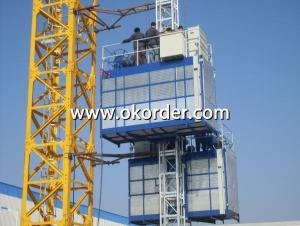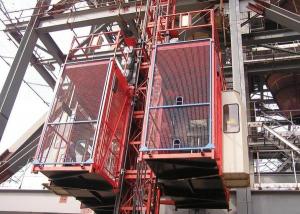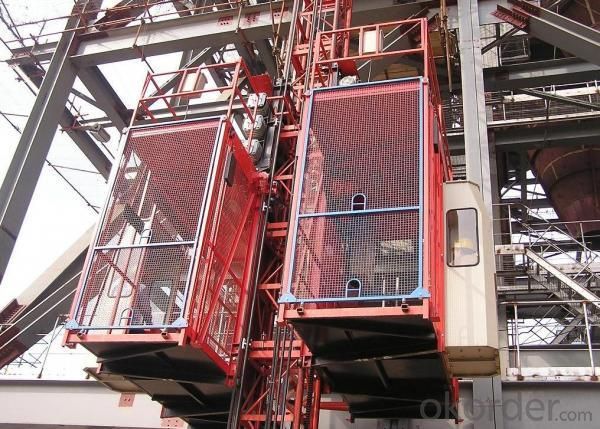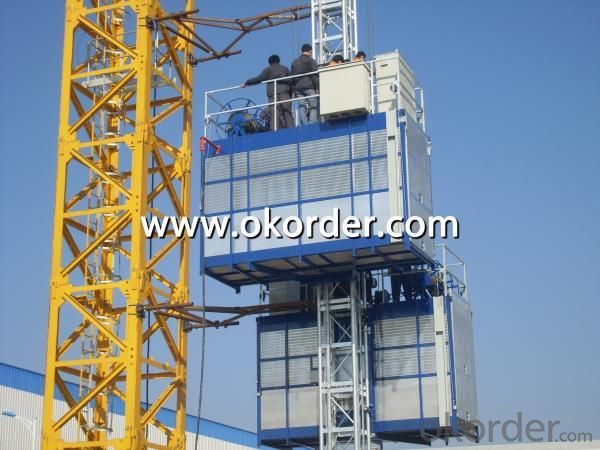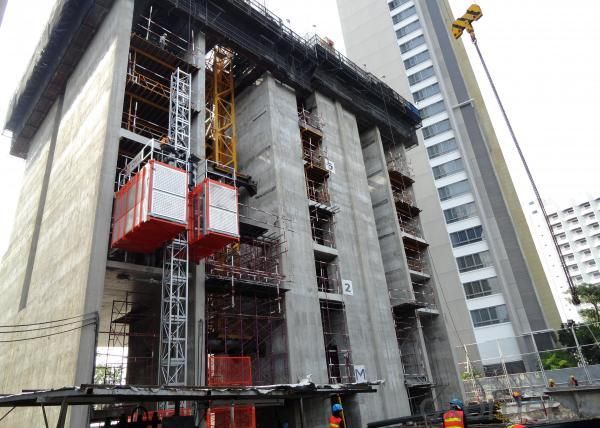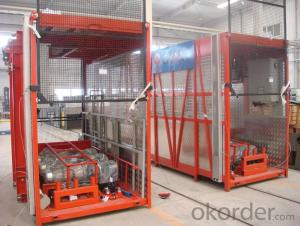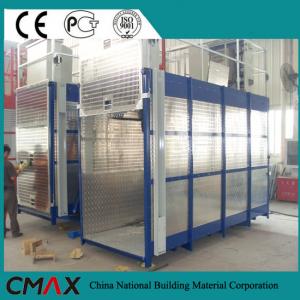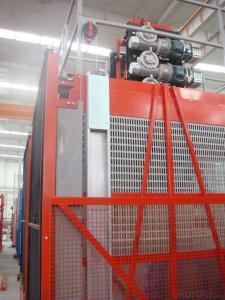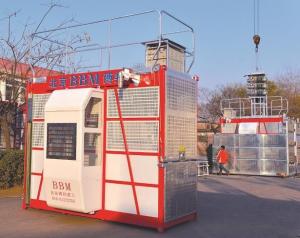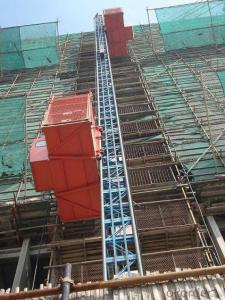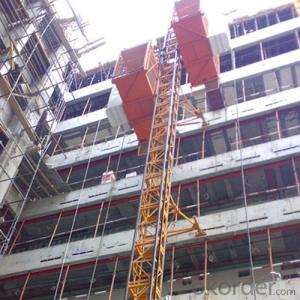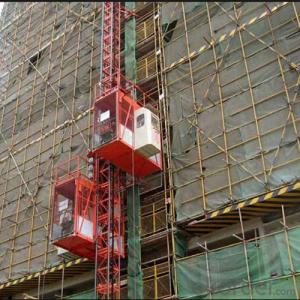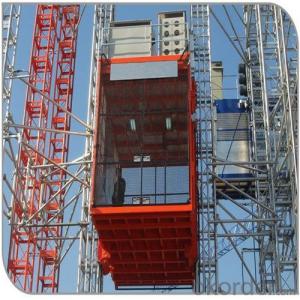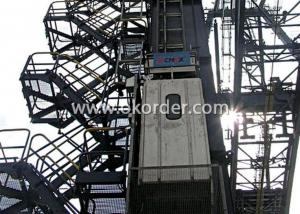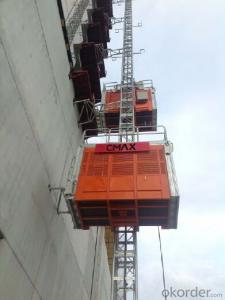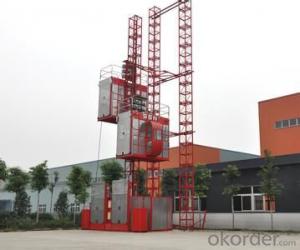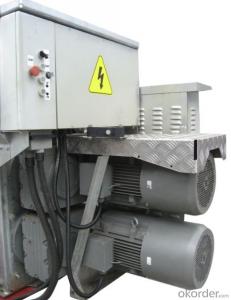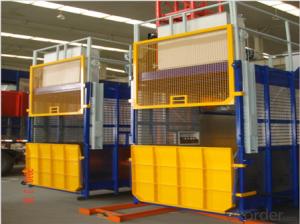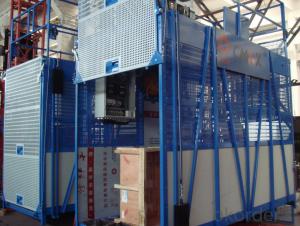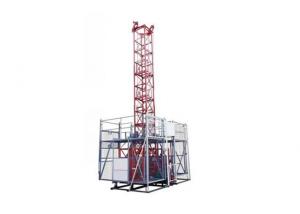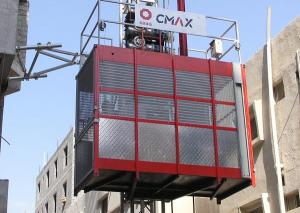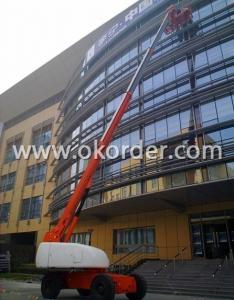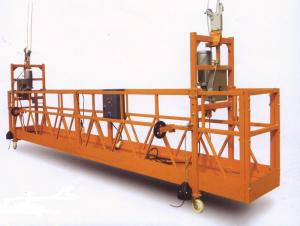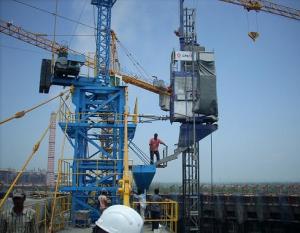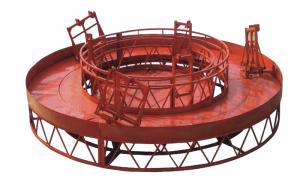Building Hoist SC100/100
- Loading Port:
- China Main Port
- Payment Terms:
- TT or L/C
- Min Order Qty:
- 1 Set set
- Supply Capability:
- 90 Sets Per Month set/month
OKorder Service Pledge
OKorder Financial Service
You Might Also Like
Building Hoist SC100/100 Technical Data
|
Lifting capacity |
1000kg/1000kg |
|
Lifting speed |
33 m/min, 38m/min, 0-60m/min (VVVF+PLC), 0-90m/min (VVVF+PLC) |
|
Max. lifting height |
300m |
|
Motor type |
Chinese motor or SEW motor |
|
Anti-drop safety device |
With our patent |
|
Cage size (L x W x H) |
Recommended size: 2.5x1.2x2.4m. We can also manufacture the cages of other sizes according to the clients. |
|
Mast section |
450x450x1508mm, hot dip galvanized or paint-sprayed. |
|
Anchor |
Distance 6-9m, hot dip galvanized or paint-sprayed. |
|
★Thewhole machinecan be designed according to your specific requirements | |
Building Hoist SC100/100
The electric parts adopt products from world renowned manufactures such as Schneider, Siemens, and LG.
The racks amd pinion adopts special material and heat-treatment technique, which prolong the life of these parts.
The steel structure uses quality steel from famous domestic manufacturers. The surface of the structure can apply paint-spray, parkerizng baking finish or hot galvanizing processing according to users requirements.
We can also manufacture cages of other size according to the user
The cage and the door material can be aluminum molded board, punched-plate,figured aluminum board or other type according to your requirementes
The mast and the tie-in surface can adopt paint-spray, or hot galvanizing processing.
We has passed ISO9000 quality system authentication. We have powerful R&D centre and professional customer support team.
Excellent quality and service are what we actually supply with.
Packaging & Delivery
Package: nude and wooden boxes in containers.
Period of shipment: 30 days after receipt of the buyer's advance payment.
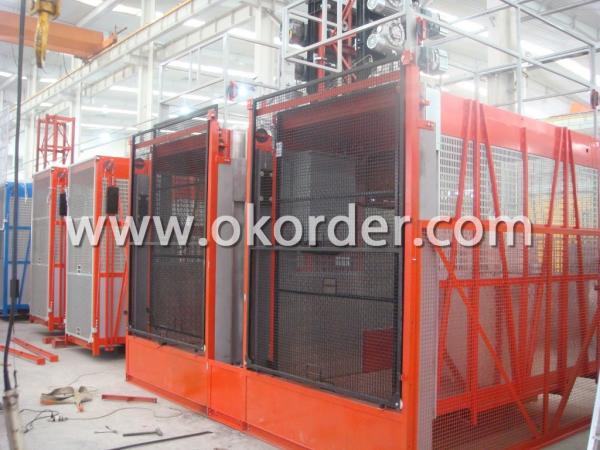
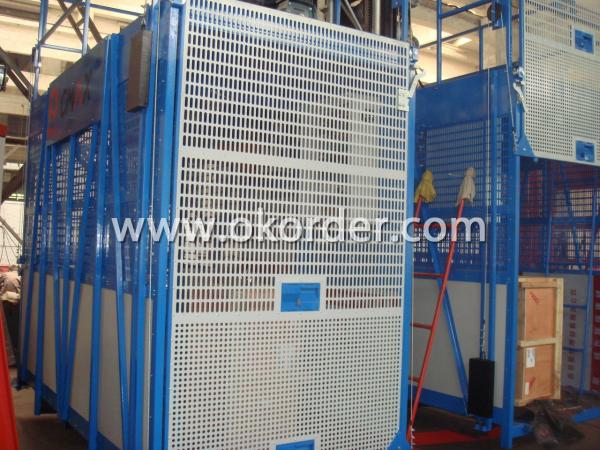
- Q: What about the energy efficiency of the escalator
- Variable frequency construction elevator energy saving effect general. Frequency conversion is not energy efficient. The difference between the frequency and the common machine is the smoothness and speed of the operation. Frequency conversion speeds up to 90m / 1 minutes and the average is only 35m / 1 min Frequency conversion when parking is slow down and stop Ordinary is directly stop delay parking and adjustment made door light who bow Angle decyl with brush spring connection will be better. The frequency conversion requires the site voltage to be strictly a little bit looser than the voltage requirement Energy consumption is: according to the elevator drive mechanism for general three transmission two kinds of the elevator are three 11 kw motor, that their energy consumption are 3 x 11 = 33 kw is hours each hanging basket consumes electricity 33 degrees, the actual power consumption will be bigger.
- Q: Is it possible to utilize a building hoist for the purpose of lifting heavy equipment or machinery?
- <p>Yes, a building hoist can be used for lifting heavy equipment or machinery, provided it has the necessary capacity and safety features. These hoists are designed to handle substantial loads and are commonly used in construction for moving materials and equipment. However, it's crucial to ensure that the hoist is rated for the weight of the equipment, and all safety protocols are followed to prevent accidents. Regular maintenance and inspection are also essential to ensure the hoist's reliability and safety during heavy lifting operations.</p>
- Q: This question asks for measures to protect lifting equipment from damage during its operation.
- <p>To prevent damage to lifting equipment during operation, ensure regular maintenance and inspection are conducted to check for wear and tear. Adhere to the equipment's load limits and never exceed them. Use appropriate lifting techniques and ensure the load is balanced. Keep the equipment clean and free from debris. Train operators thoroughly on safe operating procedures. Avoid sudden starts or stops, and ensure all safety features and guards are in place and functioning correctly. Regularly check cables, hooks, and other critical components for any signs of damage. Always follow the manufacturer's guidelines and industry safety standards.</p>
- Q: How long does the construction elevator do a crash test
- For the safety of the crane, the anti-drop safety device must be certified every 1-2 years.
- Q: Is the construction elevator a special equipment
- The construction elevator is a special equipment. Special equipment is related to life safety, greater danger of boilers, pressure vessels (including gas cylinders), pressure pipes, elevators, lifting machinery, passenger ropeway, large-scale amusement facilities and field special motor vehicles (factory) in these eight types of equipment. In order to guarantee the safe operation of the special equipment, the state of all kinds of special equipment, in three stages: from the production, use, the examination has strict rules, is a whole process supervision. According to a 2013-2017 China special equipment inspection testing industry market foresight strategic planning and investment analysis report statistics, by the end of 2011, the national special equipment comprehensive inspection agency has reached 545, including quality inspection department inspection institutions, industry inspection institutions and enterprises self-checking, in addition to type testing institutions, nondestructive testing institutions, cylinder inspection institutions, etc.
- Q: This question asks about the various types of control systems used in building hoists, which are essential for the safe and efficient operation of construction elevators.
- <p>There are several types of building hoist control systems that ensure the safe and efficient operation of construction elevators. These include: 1. Manual Control Systems: Operated by a human operator who controls the hoist's movement. 2. Semi-Automatic Control Systems: Combine manual operation with some automated features, like automatic level selection. 3. Fully Automatic Control Systems: Completely automated, with the hoist moving between floors without manual intervention. 4. Microprocessor-Based Control Systems: Utilize advanced microprocessors for precise control and monitoring. 5. PLC-Based Control Systems: Use Programmable Logic Controllers for robust and customizable control. 6. Wireless Control Systems: Enable remote operation and monitoring of the hoist. Each system has its advantages and is chosen based on specific project requirements, safety standards, and budget considerations.</p>
- Q: This question asks for measures to avoid accidents that may occur due to the misuse of a building hoist.
- <p>To prevent accidents caused by improper use of a building hoist, it's crucial to follow safety protocols strictly. Ensure all hoist operators are trained and certified. Regularly inspect and maintain the hoist equipment to check for any defects or wear. Never overload the hoist, and always secure the load properly. Implement clear communication procedures among workers, especially when the hoist is in operation. Set up barriers or warning signs to keep unauthorized personnel away from the hoist area. Finally, conduct regular safety drills to prepare for emergencies and reinforce safety practices among the workforce.</p>
- Q: Is it possible to utilize a building hoist for the transportation of heavy objects?
- <p>Yes, building hoists are specifically designed to move heavy objects vertically within a construction site. They are used to lift and lower materials such as concrete, bricks, and other construction supplies. Building hoists are equipped with strong cables and a robust mechanism to handle significant weight, making them ideal for heavy-duty lifting tasks in construction projects. However, it's crucial to ensure that the hoist is operated within its weight capacity and safety guidelines are strictly followed to prevent accidents.</p>
- Q: This question asks for the cost of a building hoist, which is a type of construction equipment used for lifting materials.
- <p>The cost of a building hoist can vary significantly depending on factors such as the hoist's capacity, type, and features. On average, a basic building hoist can cost anywhere from $10,000 to $50,000. However, for more advanced models with higher capacities or additional safety features, the price can range from $100,000 to $200,000 or even more. It's important to consider the specific needs of your construction project and consult with equipment suppliers for accurate pricing.</p>
- Q: How many meters is the wall of the construction elevator?
- The height is greater than 60 meters every six meters.
Send your message to us
Building Hoist SC100/100
- Loading Port:
- China Main Port
- Payment Terms:
- TT or L/C
- Min Order Qty:
- 1 Set set
- Supply Capability:
- 90 Sets Per Month set/month
OKorder Service Pledge
OKorder Financial Service
Similar products
Hot products
Hot Searches
Related keywords
